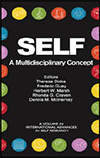
SELF - A Multidisciplinary Concept
Edited by:
Theresa Dicke, Australian Catholic University
Herbert Marsh, Australian Catholic University
Rhonda G. Craven, Australian Catholic University
Dennis M. McInerney, The Education University of Hong Kong
A volume in the series: International Advances in Self Research. Editor(s): Herbert Marsh, Australian Catholic University. Rhonda G. Craven, Australian Catholic University. Dennis M. McInerney, The Education University of Hong Kong. Frédéric Guay, Université Laval Québec. Theresa Dicke, Australian Catholic University.
Published 2021
Research on the self relates to various phenomena including self-esteem, self-concept, self-verification, self-awareness, identity, self-efficacy, passion, self-determination, and goals. Moreover, research on self is multidisciplinary and of interest to a broad range of areas, such as education, economics, (social) psychology, neuro sciences, motivation, physical activity and behavior sciences, philosophy, and learning sciences. Chapters in this volume will illustrate some of the best of the research within these disciplines examining different aspects of self from various perspectives. A feature of this volume is that we will explore not only positive aspects of high perceived levels of self-determination and competence or self-concept on achievement, motivation and wellbeing, but also the dark side of an uncertain and negative self on identity and wellbeing. We learn from this that the self is a dynamic and powerful, yet fragile and highly amenable construct that needs self-care and constant reassurance.
SELF – A Multidisciplinary Concept thus highlights the broad application of self-research and its diversity. This volume is intended to develop both theoretical and methodological ideas and to present empirical evidence of various disciplines and applications dealing with self. The scope of this seventh volume of the International Advances in Self Research series, started in 2000 by Herbert W. Marsh, Dennis M. McInerney, and Rhonda G. Craven, is thus very broad. Keeping within the tradition of the series, this volume will highlight the applicability of a multitude of empirical approaches and methods to self-research. We also aimed to maintain a balance between discussing theoretical research in SELF and deriving implications for effective practice. This volume thus includes chapters covering self-related topics within an educational, social, emotional, psychological, physiological, managerial, and health context.
CONTENTS
Preface. Self-Appraisals and Emotions: A Generalized Control-Value Approach, Reinhard Pekrun. Dimensional Comparison Theory: New Models, New Methods, New Insights, Jens Möller, Fabian Wolff, and Friederike Helm. The Distinctions Separating the Social Classes: An Examination of Noncognitive Variables in Educational Contexts, Jennifer Archer and Nathan Berger. A Collaborative Approach to Building Youth Well-Being: A Case of a Municipality, Dianne A. Vella-Brodrick, Tan-Chyuan Chin, Adam Cooper, and Edwina Ricci. Do We Need Motivation to Sit Less? Thoughts on a Psychology of Sedentary Lifestyles, Stuart J. H. Biddle. Strengths-Based Approaches to Disability: Self-Determination and Autonomy-Supportive Interventions to Empower People with Disabilities, Michael L. Wehmeyer. Mind-the-Gap: Bright and Dark Sides of Digital Use, Self-identity, School Engagement, and Burnout, Katariina Salmela-Aro. The Helpful Self and the Hurtful Self: Positive and Negative Effects of Self-Processes on Well-Being, James E. Maddux. The Uncertain Self: Positive and Negative Influences on Social Identity, Group Behavior, and Leadership, Michael A. Hogg. About the Authors.
-
Paperback978-1-64802-262-3
Web price: $45.04 (Reg. 52.99)
-
Hardcover978-1-64802-263-0
Web price: $80.74 (Reg. 94.99)
- eBook978-1-64802-264-7

- SEL031000 - SELF HELP: PERSONAL GROWTH: General
- PSY023000 - PSYCHOLOGY: Personality
- PSY030000 - PSYCHOLOGY: Research & Methodology
-
 Farewell to Variables
Farewell to Variables
-
 International Advances in Self Research - volume 1
International Advances in Self Research - volume 1
-
 New Frontiers for Self Research
New Frontiers for Self Research
-
 SELF - Driving Positive Psychology and Wellbeing
SELF - Driving Positive Psychology and Wellbeing
-
 Self-Concept, Motivation and Identity
Underpinning Success with Research and Practice
Self-Concept, Motivation and Identity
Underpinning Success with Research and Practice
-
 Self-Processes, Learning and Enabling Human Potential
Dynamic New Approaches
Self-Processes, Learning and Enabling Human Potential
Dynamic New Approaches
-
 Theory Driving Research:
New Wave Perspectives On Self-Processes And Human Development
Theory Driving Research:
New Wave Perspectives On Self-Processes And Human Development

